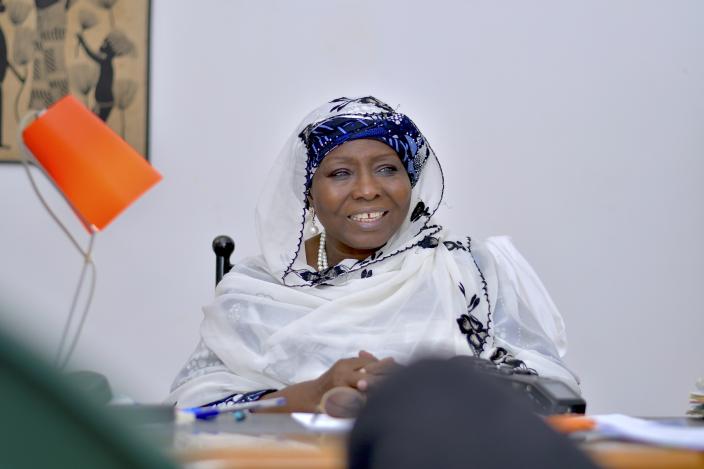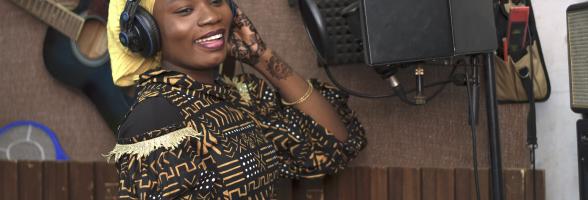“Women play a crucial role in promoting peace and have a natural talent for promoting reconciliation and conflict resolution, but regrettably their rights and leadership are often neglected during crisis and war.”
In Niger, Ibrahim Mariama Allassane is the coordinator of an NGO called Réseau des Femmes pour la Paix au Niger (REFEPA Niger). Since 2006, Mariama Allassane and her colleagues have been inspiring change and peace on the frontlines of conflict – and they will keep pushing. Read our interview with her below.
Question : Can you tell us about your community/society and the conflict or insecurity that exists?
Mariama Allassane: It's no secret that our country has been experiencing growing insecurity for several years now. We were already confronted with conflicts, whether minor, social or linked to the demands of some communities. Today, however, we are faced with a situation of insecurity created by armed groups describing themselves as Jihadists.
We are also currently facing another type of crisis, with the sanctions imposed on us by the international community, in particular ECOWAS, in response to this unconstitutional power takeover.
Question : Can you describe your activity/initiative and the role you play?
Mariama Allassane: In the early days, our NGO was frequently asked to help mediate between the government and students. We were also involved in solving issues such as those that arose in Diffa and during the first rebellion in Niger. Our former coordinator went to Agadez with the help of the NGO "Femmes contre la Guerre", which facilitated contact with the leaders of the rebellion in order to negotiate peace. At the time, these conflicts could be considered minor in scale compared with the challenges we face today.
Over time, however, our NGO has broadened its scope to focus more on women's rights and equal rights, particularly in relation to rural land ownership. We found that in a predominantly rural country like Niger, women were often deprived of their land rights.
For example, after marriage, a wife receives a small plot of land from her husband, which he takes back in the event of divorce. These practices are common in both Zarma and Haoussa areas, and remain the same. This plot of land is used to grow vegetables for the family kitchen. In the event of divorce, the woman generally only receives child support, with no division of property or joint ownership. She loses all her rights, including to the land. However, it is important to note that a woman has the right to inherit after her husband's death, particularly with regard to his land. The laws provide that she may inherit one eighth of the property left by her husband. This rule applies regardless of the number of wives. They share one eighth of the property, including land. The Koran stipulates that women have the right to inherit property from their fathers and husbands in specific proportions. In practice, however, men are able to circumvent these provisions, as most women do not have official identity papers.
Through awareness-raising activities and talks, we have succeeded in encouraging many women to get their own identification documents, which has enabled them to secure their property. Nowadays, this is not such a major concern, although in some parts of Niger the problem persists. I recently heard that a woman had no right to land in a village in the west of the country, where it was considered that the land should be shared between her sons. In response to such cases, we set up a training programme for a thousand women mediators in three regions of Niger: Tillabéry, Maradi and Dosso.
Among the many other projects we have undertaken, one was aimed primarily at mitigating inter-community conflicts between farmers and herders in the Dosso region and the Madarounfa department. Every year, these areas were the scene of violent clashes, sometimes even resulting in deaths among farmers and herders.
To deal with this situation, we selected 27 villages considered to be at high risk. In these villages, we identified women leaders, chosen by their communities, and trained them. We taught them the principles of the Rural Code, which solved many problems. We then taught them mediation techniques on issues such as crossing paths, grazing areas and compliance with opening and closing seasons during the cold season. These women were equipped with radios and kakemonos on these subjects, so that they could raise awareness at events such as weddings or market days. In the event of conflict, they would intervene to apply what they had learned. As a result, those who were causing harm found themselves reporting it themselves, whereas previously, especially farmers, would run away to avoid punishment. In addition, we provided them with village records to keep track of the problems encountered. This enabled us to monitor and evaluate their work and see what they were able to resolve in terms of conflicts.Haut du formulaire
It is crucial to reinforce that we are committed to addressing the root causes of insecurity on an ongoing basis. We recently completed a project in the south of the Maradi region, where we focused on the problem of youth unemployment, in response to the massive recruitment of young people by armed groups. We worked in 28 villages, and in each of them we asked young people about their aspirations in terms of jobs. Based on their needs, we set up training centres in mechanics, sewing, cosmetics, groundnut oil extraction and knitting. At the end of their training, we supported them by providing them with kits so that they could pursue their activities on a long-term basis. In addition, we have set up functional literacy programmes for young people and women in these villages, using modern buildings that we have built specifically for this purpose. This contributes to greater stability and offers new prospects for young people and local communities.
Question : Can you tell us about your career path and the challenges you faced (if any)?
Mariama Allassane: What has personally led me to get involved in this work, including politics, is that I am in direct contact with the community. People around me believe in me and ask me questions or ask me to solve their problems. When I was elected to parliament, we were sometimes sent out as parliamentarians to listen to the various sides and try to resolve local conflicts that arose in our area. In 2006, the coordinator of our association, whom I meet regularly, took part in an international meeting in Conakry, a workshop on conflict resolution organised by the Monrovia women's network. They wanted to share their experiences with women from ECOWAS member countries. The coordinator of our association invited us to take part in this event. On that occasion, we took the decision to create women's networks for peace in the ECOWAS member states. We realised that there were many conflicts in the sub-region, and we were inspired by the experience of the women of Monrovia, who had made a huge contribution to bringing peace between the member states. They had even been granted observer status within the African Union and ECOWAS.
At that time, in Niger, the challenges were linked to the rebellion, and it was essential for women to get involved from the early 2000s under resolution 13-25. This resolution was well accepted, because today, prefects, canton chiefs and village chiefs are all aware of the essential role played by women mediators. They regularly call on these women to resolve various problems, whether family disputes, disagreements between herders and farmers, or other disputes. These women mediators have succeeded in reconciling villages that had been in conflict for decades.
Question : Do you think women play an important role in achieving peace?
Mariama Allassane: Absolutely! Women play a crucial role in promoting peace. As mothers and wives, they are often listened to and respected within their communities. Women have a natural talent for promoting reconciliation and conflict resolution. Perhaps this is linked to their unique role in the creation and preservation of life, but they also have a unique ability to resolve issues when conflict arises.
This highlights the importance of including women in peace and mediation processes, as their perspective and skills are invaluable in building a more peaceful future.
Question : Do you think that women play a sufficient role in building peace in your context (village, town, country)?
Mariama Allassane: No, I would say that they have the potential and the necessary skills, but they are not always fully involved. In Niger, we have trained women mediators in just ten districts, even though we have 276 districts in total. Initially, some stakeholders, such as traditional chiefs, were reluctant to follow our women mediators into the training rooms. We had to explain to them that these women were in fact their allies, whom they could trust. They saw that these women mediators resolved major conflicts, and now nothing is done without them! It's the village chief himself who requests the presence of these women in any conflict resolution.
If this approach could be scaled up to national level, it would go a long way towards solving many problems and providing a better framework for the population through the mediation of women mediators.
Question : What are your motivations, and what are you aiming to achieve with your initiative?
Mariama Allassane: Our main goal is to contribute, particularly through women's leadership, to influencing peace, working for its return and fighting for it. We want to be fully involved in conflict prevention and management issues at national level, while safeguarding women's rights. It is regrettable that during periods of crisis and war, women's rights are often neglected. We have all witnessed the many attacks on women in certain regions, whether by armed groups or the defence and security forces that are supposed to protect them; we are even aware of cases of rape committed by soldiers, and we have supported the victims while seeking to raise awareness among them and their families, in order to help them reintegrate into society. We have also given them small grants to help them start up their own businesses.
I would also like to point out that with the current climate of insecurity, we are witnessing the emergence of numerous women's groups and NGOs, each working in a specific sector to promote peace. Following the military takeover on 26 July, women came together to make important statements. Recently, an NGO invited us to a 'women's dialogue', during which women were able to express their opinions on the expectations of the population. It is encouraging to see women taking the floor to share their views on the current situation.
As far as the humanitarian and security aspects are concerned, we need to work hand in hand to achieve more significant results. Each of us is working for the return of peace, and the recent discussions at the women's dialogue have highlighted many concerns. Women have broken the silence and are determined to preserve the gains made so far.

